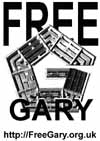Home Secretary Jacqui Smith says that people "can't wait" for ID cards to come in. Whoever is coming up to tell her this is, I'd like to suggest, not representative of the entire nation. Frankly, I don't believe it happens all that much.
Can anyone actually say what ID cards are for? Originally, we were told that they'll combat terrorism, but no one could explain how. Next, they were to confirm our identities when we need to do so (getting a passport, etc.) but we can already do that. Then they were to confirm our identities when making a purchase (chip & pin, anyone?) Now they're asserted as being simply a Good Thing. But, seeing as we will not be compelled to carry them, for whom are they a Good Thing?
Well, consider this: The total cost of implementing the ID card scheme now stands at £5.1 billion and the projected compulsory cost to every adult in the UK looks like being £60. Smith claims that the market for issuing passports and ID cards is set to be around to £200 million a year. Would I be cynical in thinking that this is about generating cash, not national security or to "help" us in some indefinable way?
Now, the serious point: ID cards are supposed to be uncrackable. That's fair enough, but as anyone who's ever thought about it for a short while may have noticed, the forms of ID we'll have to provide to get one of these super-duper cards are all less secure. It's like locking a safe inside another safe like a series of Russian Dolls. You still have to hide the key or combination to the outer safe somewhere. This is the eponymous weakest link. And, because security is only as strong as its weakest link, it's open to abuse - as Ms Smith found out this week when a group calling itself No2ID took a glass she'd been drinking from at a conference. This glass apparently has her fingerprints all over it.
So, do we, as Ms Smith asserts, really want to be forced to pay £60 for something that will languish in the back of the bits drawer at home? I think not. Maybe it's time I started a petition: The Campaign for Real Big Brother, calling on the government to either implement a proper, competent police state or to forget the whole idea. No bumbling about in the middle ground promising it will provide indefinable "benefits". It'd be a satirical campaign, of course, but like all satire it has a serious point. Stop wasting our time and money, Ms Smith. The people the terrorists want to blow up is the likes of you, not us, the poor sods they can and do get to. And yet, we're the ones being eyed suspiciously, 24/7.




